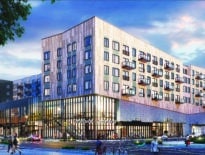Transportation Secretary Monica Tibbits-Nutt found herself in an unfortunate political firestorm last week thanks to her willingness to say the truth: We should give a hard look at adding tolls to other highways in Massachusetts.
The secretary certainly didn’t pick the most politically efficient or effective way to raise the point when she spoke to the Walk Boston advocacy group. Her word choice for her short speech clearly gave some the impression that Tibbits-Nutt was dictating policy to the transportation finance working group she chairs, instead of trying to find consensus among its disparate membership.
Even Greater Boston Chamber of Commerce CEO Jim Rooney, probably the state’s highest-profile supporter of more tolling, was miffed that she was expressing such strong support for the idea when his fellow working group members hadn’t even discussed it yet, according to CommonWealth Beacon. Add in a freakout from the largely irrelevant right wing of state politics and Gov. Maura Healey had to go on one of the most popular news radio stations in the commonwealth to clean up the mess.
Brava to the governor, however, for keeping Tibbits-Nutt in her post and expressing confidence in her leadership, and kudos to Senate President Karen Spilka for coming to the secretary’s defense as well. But we’re less enthusiastic about Healey’s decision to give into the right wing and seemingly reject the idea of tolls out of hand in her interview with WBUR.
The Hard Truth About Highway Tolls
The hard truth is we likely need some additional tolling. The gas tax has not kept up with the highway system’s repair needs for years. Last fiscal year, the state collected $1.17 billion in revenue from highway, bridge and tunnel tolls, the gas tax and diesel tax combined in fiscal 2023, according to MassDOT’s annual report, compared to around $2 billion it spends a year in highway repairs and maintenance.
That imbalance is only going to get worse as we transition to electric and hybrid vehicles, as we all know we must do to stop climate change from getting any worse. And adding more highway tolls is probably the simplest and least invasive way to manage this problem in a world where most EV owners will be able to charge their cars at home.
Imagine the challenges and vast expense involved with first creating a modification for existing home EV charger designs that can meter at-home car charging, then the additional challenges and cost inspecting each one of those metered chargers to ensure they’re all working properly and they aren’t being tampered with.
Tolling technology is well-tested, straightforward and has an existing infrastructure – including discounts for people traveling locally, as Tobin Bridge communities receive – to build upon.
On top of that, it’s fair. Why do drivers in Ashland and Beckett and Chelsea have to pay tolls to use their local highway to get to work or school, when the residents of Burlington and Marshfield are under no such obligation?
That’s not to mention MBTA riders, who have to pay a much higher fee each time they want to use that system – $2.40 each way on the subway – than the $0.24 per gallon a driver pays in tax when they fill up their car or truck, which typically gets 20 to 30 miles per gallon.
Big Needs and No Free Lunches
But let’s get back to the real meat of the case: We simply need more and better transit to unlock the new housing Massachusetts needs, and that’s going to cost money.
Yes, it’s possible to find ways to lower the state’s bills. For example, a public-private partnership to electrify and increase frequency on the commuter rail network or to build out West-East Rail could theoretically. That is, if state officials are given enough training and resources to avoid previous public-private partnership boondoggles like the billion-dollar, Baker-era “Automated Fare Collection 2.0” project at the MBTA.
But it’s an unfortunate fact that there are no free lunches, and the federal government isn’t likely to step up and provide big new pots of transit funding any time soon.
At the end of the day, we need those fast, frequent electric trains if we want to help make climate-friendly and affordable suburban housing buildable by cutting out millions of dollars in parking garages from their construction budgets.
And we’ll need suburban bus networks to get people to those train stations and to feed suburban job centers like Burlington and Marlborough if we want to get a handle on our crushing traffic problem.
We’ve got to find the money to pay for this shift and tolls should be seriously considered as part of the solution.
Letters to the editor responding to this editorial or other topics may be submitted via email at editorial@thewarrengroup.com with the subject line “Letter to the Editor.” Submission is not a guarantee of publication.






